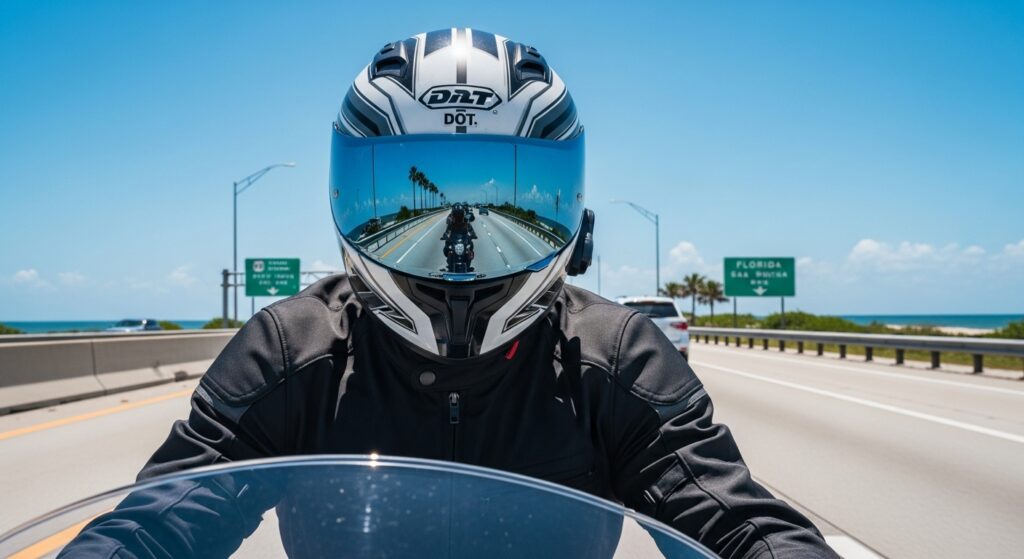Riding a motorcycle in Florida offers freedom, sunny roads, and scenic views—but it also brings risks. One of the most important legal and safety questions for riders is: Does Florida require a motorcycle helmet?
The answer is: it depends. Florida has a partial helmet law with conditions and exceptions that many riders don’t fully understand.
Florida’s Helmet Law: The Statutory Framework
Florida Statutes § 316.211 is the controlling statute. It requires that “a person may not operate or ride upon a motorcycle unless the person is properly wearing protective headgear … which complies with Federal Motorcycle Vehicle Safety Standard 218.”
It also mandates that riders wear eye protection unless the motorcycle is equipped with a windshield.
However, §316.211 includes a key exemption: a person over age 21 may operate or ride without a helmet if that person is covered by an insurance policy providing at least $10,000 in medical benefits for injuries incurred in a crash.
Who Must Wear a Helmet
- All operators and passengers under the age of 21: helmet is mandatory.
- Operators and passengers 21 or older: can ride without a helmet only if they carry qualifying medical benefits insurance (≥ $10,000).
Exceptions and Special Cases
Even the helmet statute has carve-outs. §316.211 provides that the headgear requirement does not apply when:
- The rider is within an enclosed cab (e.g. an enclosed cab motorcycle).
- The vehicle is a moped (motor ≤ 50 cc or ≤ 2 brake horsepower, incapable of >30 mph on level ground) and the rider is ≥ 16.
- For mopeds, those under 16 must still wear a helmet.
Helmet Standards and Eye Protection
Not just any helmet qualifies under Florida law. The helmet must meet Federal Motorcycle Vehicle Safety Standard 218 (FMVSS 218). That means structural integrity, shock absorption, secure straps, and labeling are required.
All riders, regardless of age or helmet usage, must wear eye protection (goggles, face shield, or approved eyewear), unless their motorcycle has an approved windshield. Note: regular sunglasses or prescription glasses often do not satisfy the legal requirement unless they are safety-rated.
Penalties for Violating the Helmet Law
A violation of §316.211 is a noncriminal traffic infraction, treated as a nonmoving violation under Chapter 318. Fines tend to be modest (e.g. ~$30). Because it’s noncriminal, it does not result in jail or points on your driving record strictly for the helmet violation.
The Safety Rationale: Why Helmets Still Matter
Even though some riders legally may opt out of helmet use, the safety case for wearing a helmet is strong:
- Helmets are estimated to be about 37 % effective in preventing fatal injuries to riders.
- States with universal helmet laws see lower rates of head injury and fatalities.
- Riding without a helmet dramatically increases the risk of traumatic brain injury or skull fracture.
Helmet Use in Crash Claims & Litigation
One often-overlooked legal issue: if you ride without a helmet (legally permitted or not), it may affect your ability to recover damages after a crash.
- Florida applies comparative fault rules. If opposing counsel argues that your injuries were aggravated by your failure to wear a helmet, your recovery could be reduced.
- Not wearing a helmet is not an automatic bar to recovery, especially if your injuries are unrelated to head trauma.
- In practice, insurance adjusters often use non-helmet use to shift blame or argue diminished damages.
Historical Context & Impacts of the 2000 Reform
Prior to July 2000, Florida had a universal helmet law. That changed when the current partial law took effect. Studies comparing pre- and post-2000 data show notable rises in motorcycle fatalities after the law was relaxed.
That said, Florida is relatively unique: few states allow adult riders to legally forgo helmets under an insurance-based exemption.
Best Practices for Riders in Florida
- Wear a DOT-/FMVSS-218 certified helmet every time—even when legally exempted.
- Maintain clear proof of qualifying medical benefits insurance if you plan to ride without a helmet and are over 21.
- Always wear eye protection (goggles, face shield, etc.).
- Replace helmets after a crash or every 3–5 years per manufacturer guidance.
- Keep documentation of any crash, including medical records tied to head injuries.
- Consult an experienced Florida motorcycle accident attorney if you’re injured, especially if helmet use becomes an issue.
FAQs
Q1: Does Florida require all motorcyclists to wear a helmet?
A: No. Florida has a partial helmet law. Riders under 21 must wear a helmet. Riders 21 or older may ride without one only if they carry an insurance policy offering at least $10,000 in medical benefits.
Q2: What kind of helmet is legal in Florida?
A: A helmet must conform to Federal Motorcycle Vehicle Safety Standard 218 (FMVSS 218). It must be properly secured (strapped), show appropriate labeling, and meet structural/impact standards.
Q3: Are passengers subject to the same helmet rules?
A: Yes. A passenger under 21 must wear a helmet. A passenger 21 or over may ride without one only if the same insurance condition is met. Eye protection rules apply to all passengers.
Q4: What are the penalties for riding without a helmet?
A: That is a noncriminal, nonmoving traffic infraction. Fines are modest (often ~$30). It does not carry license points or jail time.
Q5: Does riding without a helmet affect my accident claim?
A: Possibly. Florida’s comparative fault framework allows defense to argue your injuries were worsened by helmet nonuse, reducing your compensation. But nonuse is not an automatic bar to recovery.
Q6: Can I ride a moped or small engine vehicle without a helmet?
A: Yes, under §316.211, a moped (≤50 cc, ≤2 bhp, ≤30 mph) ridden by someone 16 or older is exempt from the helmet requirement — but riders under 16 must wear a helmet.
Q7: Is proof of insurance required when riding without a helmet?
A: Yes. Law enforcement is directed to accept a health insurance card or declarations page showing current medical coverage as proof.
Q8: When did this partial helmet law take effect?
A: The current law went into effect on July 1, 2000, replacing Florida’s previous universal helmet requirement.
Q9: How often should I replace my helmet?
A: Most manufacturers recommend replacing it every 3–5 years or immediately after a crash, because even minor impacts may compromise structural integrity.
Q10: If I’m over 21 and carry proper insurance, should I still wear a helmet?
A: Absolutely. Even if legally exempt, helmets significantly reduce the risk of severe head injury or death. They also strengthen your position in injury claims.
Before you hit the road, make sure you are covered with motorcycle insurance from GreatFlorida Insurance.



